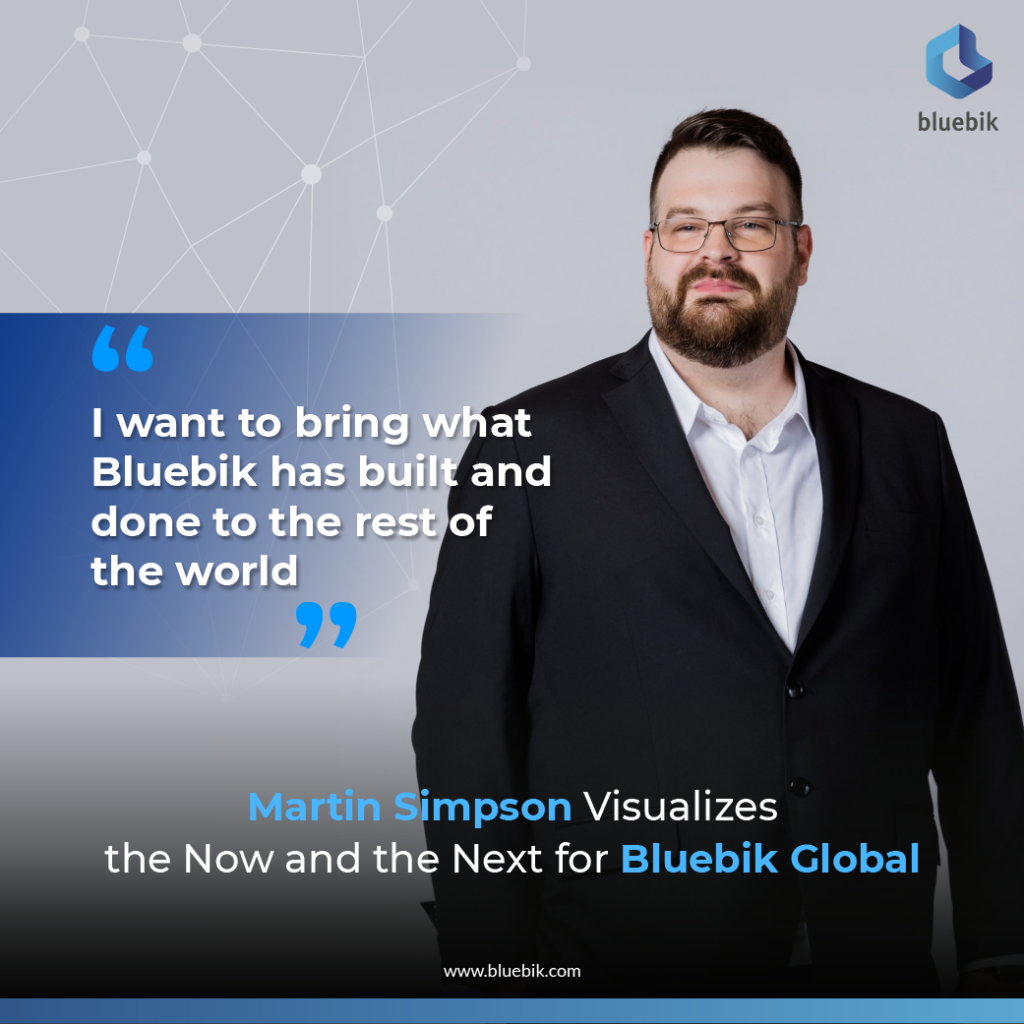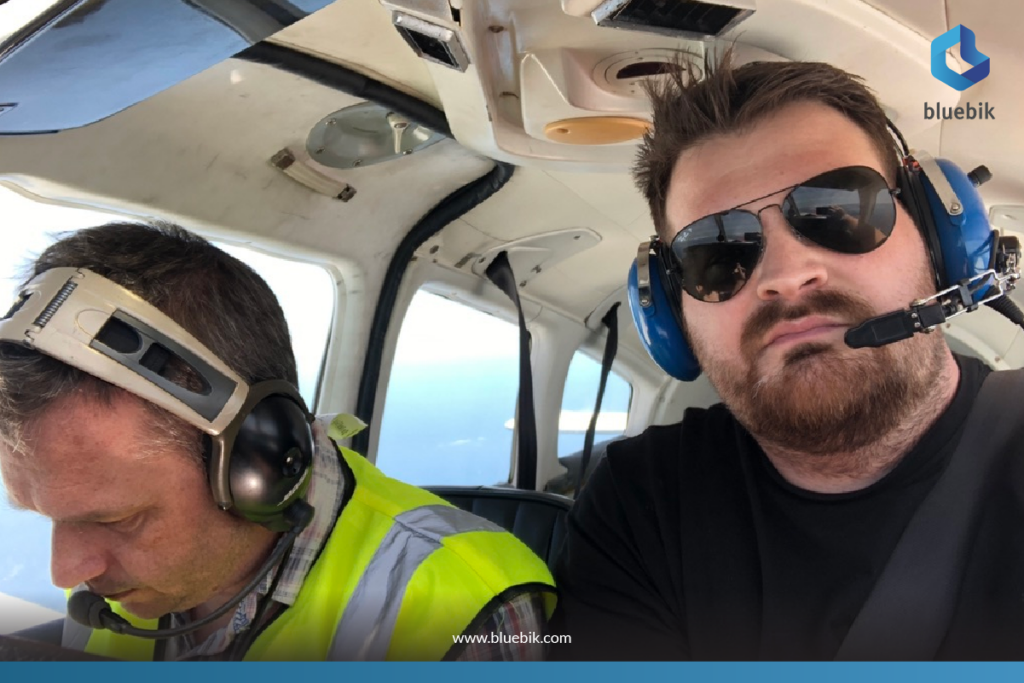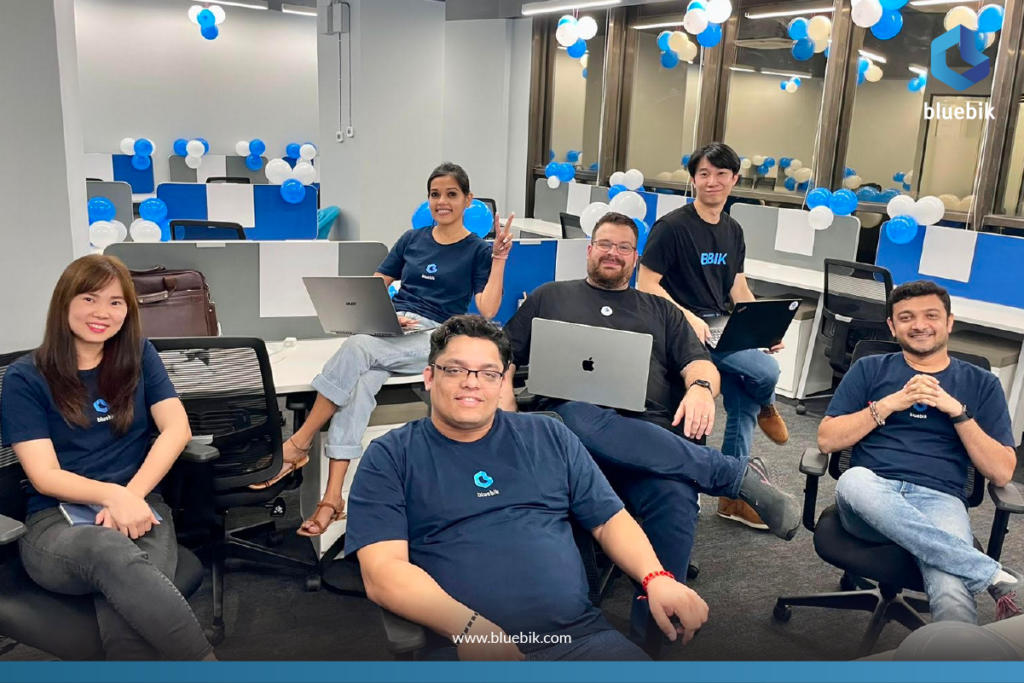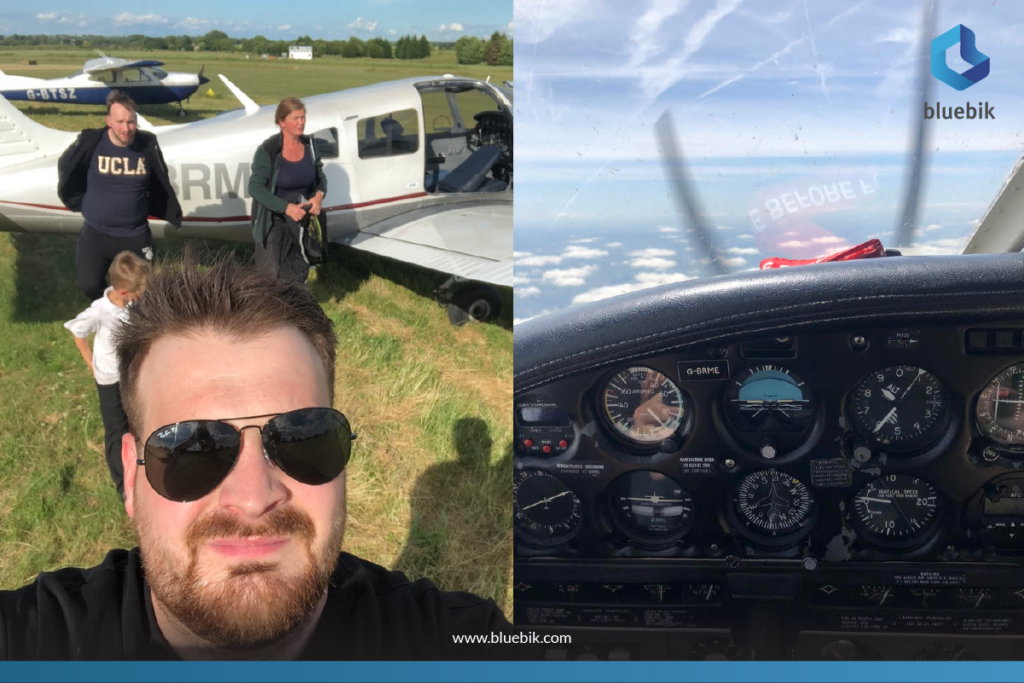Here are some anecdotes everyone in the Simpson family knows by heart. During his kindergarten years, little Martin Simpson loved coming to school early to help his teachers turn on the computers.
On his tenth birthday, the boy got his first computer. (“an intel 386 running windows 3.1,” he still remembers vividly.) He played with it, broke it, and fixed it—all by himself.
On a visit to the library, the amateur technician asked for an MS-DOS manual and read it cover to cover. “I was very inquisitive,” he describes himself.
Fast forward to today, Martin is the director of Bluebik Global, an end-to-end digital transformation consultancy and delivery company with offices in the UK and Vietnam and a technology center in India. Mind you, the company is only 1 year old, and this is just the first few yards of his sprint to bring Bluebik Global’s mastery to the world. “One thing I don’t do is move slowly. If I want something, I do it immediately.”

Speed is not the only success factor, however, as Martin’s deep passion for tech also comes into play, though he may phrase it differently. “I think it’s more that I’m into building things. I like complex, intricate systems, and in tech, there are infinite numbers of ways you can build complex, intricate systems.”
At sixteen, Martin got his first job as a technical support worker at the UK office of ThoughtWorks, one of the world’s leading technology consultancy. Initially, his primary responsibility was to build laptops and install the necessary software for new employees. It was enjoyable to some extent, but the first jobber craved something more complex and intricate. So, he started to play with it, automating as much of the process as possible. This initiative, of course, was noticed by the upper-level managers, one being Ajey Gore, who took the bright-eyed prodigy under his wings.
“He taught me a lot of the stuff that I use today,” Martin said of Ajey, who was Gojek’s CTO and now works for Sequoia Capital as the Operating Partner, Technology.
By “teaching,” Ajey assigned Martin more and more complex projects, which he was excitedly up to the tasks. At one point, Martin was flown to the US and India to help with ThoughtWorks’ international telephony system. And before he knew it, Martin started to work in a client-facing role, giving out technological consultancies.
“I think Ajey saw someone technically competent and, more importantly, excited about this sort of stuff. A lot of people come to work because it’s work. Some people come to work because they really want to work. I was the second type.”
“There was a time when we were in our Bangalore office in India, working on the telephony system to go outbound from the India office to the telephone network. We had a problem, so Ajey and I were in the office until 5 a.m. trying to fix it, tearing apart the cables, and doing cable tests. It was purely deep tech work, and neither of us had to stay there realistically, but we just enjoyed doing it. It turns out it was not our fault. The ISP connected the cable wrong, so we wasted our time. But I think that was what Ajey saw. Tech people can see tech people who enjoy it.”
After ThoughtWorks, Martin became a software developer in Montreal, Canada, for a year. Although the project didn’t work out, he had fun and understood the business of digital products more. (“Some software developers think they can get rich off just building a good application, and it doesn’t require any marketing and sales effort, but those applications are few and far between,” he reflected.)

Back in the UK, Martin worked as a system administrator at a company for a while. Then he started to work as a contractor on many IT and digital projects for multiple companies. One of his more extended, significant projects included developing digital platforms for F1. (Yes, if you’re a fan who likes to watch the motor race on tablets or any mobile devices, you have him to thank.) For this project, Martin also learned how to code in Ruby.
At this point, if we can learn one thing from Martin, it’s this: don’t ever stop learning and evolving. If there’s a list of his competencies, here’s how it looks.
Tech support – checked
System administration – checked
Software development – checked
Coding – checked
DevOps – checked
Being a tech all-rounder, Martin was sought after by many companies, even a company in a country half the world away—you guessed it—Thailand!
“A company in Thailand needed a travel system, so I moved to Thailand to build that system. It went from nothing—literally the first line of code being written—to this application that gets millions of searches per day.”
By the time he left the company, Martin was the DevOps engineer and CTO with an entire team running the travel system. They pivoted and scaled, and in Martin’s own words, “we went through a full digital transformation, not only the company but I myself.”
Now, with this full-stack experience, Martin is ready to take on the most exciting project: Bluebik Global.
“Bluebik is fantastic in what it does, we have a good reputation amongst the largest consultancy companies in Thailand. I want to take what Bluebik has built and done—its reputation, its brand, the total package—and bring that to the rest of the world and compete internationally with all the top consultant firms.”
“What sets us apart from other firms is the combination of tech and consulting abilities. They usually have very good consultants and may have their tech people, but tech integration is not deep enough in those organizations. On the contrary, the projects I run with Bluebik Global have tech people all the way up. I’m the director of Bluebik Global, and I have extensive tech experience, and so does everyone working on the client’s team. Our consultants’ combined tech skills and people skills add more value to the projects.”

In terms of people skills—Martin is at his best leading by example.
“When I talk to clients, I might be talking to non-technical people. I have to explain why the company should change its architecture in a way that non-technical people can understand and still be true to the underlying vision. I also have to explain it in a way that doesn’t make them feel like I’m all high and mighty. If there’s an engineer on the client side, I have to ensure they understand that I’m here to help them, not fight them, because they might not want me there. Better yet, I have to explain it in a way that the engineers want to work with us.
“The last project we had, we had a meeting set up for ten people, but twenty-four people joined. Those extra fourteen people heard the meeting was happening and just wanted to listen. This is all people skills. I can tell them what I’m doing tech-wise, but it’s useless unless I make sure they want to do it.”
Although Martin loves building and maintaining complex, intricate systems, he admits to doing less of that now as the director of Bluebik Global.
“Most of my work these days is recognizing what we need to do as a company on a high strategic level and making sure things run smoothly. Preparing for what you can’t plan for. Expanding. Looking out for risks—mitigating, but also taking the risk when you need to. So what I’m doing right now is still building something, but it’s not a computer system, it’s a big operating model for a company, and that’s where all the skills come into play, especially the people skills. I may not be able to convince you of something, but at least I will be able to explain. Make sure you understand it and get your point of view. From there, we have a shared understanding. A shared understanding can then be used to move forward. Working with my team, I don’t like to be, “Let’s do it because I said so.” I want to be, “Let’s do it because we agree it’s the right way to do it.” I want to have a good discussion with my team.
These days, Martin rarely has any free time, but when he does, he goes flying the plane. “I got a private pilot license for a small plane. I love flying because, firstly, when you look out the window, it’s beautiful. Secondly, flying is relaxing. It’s like a form of meditation. When you fly, you’re not thinking about anything else because the task load is high. You’re focusing on what you’re doing, not about tomorrow, not about next week.”

“In a way, flying is similar to running a business; you have multiple things you need to do simultaneously, and it helps prepare you for dealing with difficult situations. If the engine goes out when you’re 5,000 feet up in the air, you must be able to perform all the emergency procedures automatically. Okay, nose down, look for a place to land, communicate.
“If something goes wrong when running a business, okay, assess the situation, understand it, and go forward with the best possible solution you can come up with at that moment. Many people scream or cry when something goes bad, but if you’re on a plane and your pilot starts screaming or crying, that’s a problem. You would want your pilot to be the calmest person on the plane.”
For anyone who wants to work in tech, here’s advice from the pilot of Bluebik Global. “Be inquisitive. Go find what excites you and what you want to learn more about, and move towards it. Move fast and break things. The tech industry is constantly evolving. So, get into the latest and greatest tech, understand it, break it, and fix it. All of these will give you the knowledge you need. I guarantee that every single tech person will break things. You will break production. You will take the website down. It’s okay. It happens. That’s the learning experience.”
Want to move fast and break things with Martin? Send your CV at [email protected]




